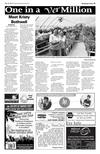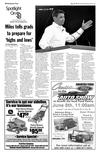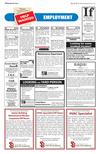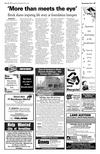4


04 Broadcaster Press
May 28, 2013 www.broadcasteronline.com
Spotlight
On
Miles tells grads
to prepare for
‘highs and lows’
By Travis Gulbrandson
travis.gulbrandson@plaintal
k.net
Olympic pole-vaulter
Derek Miles had some
words of advice for the
Vermillion High School
class of 2013 – learn to
navigate the highs and
lows of your life, revel in
your victories and keep
perspective.
Miles made his remarks
as featured speaker in the
graduation ceremony that
was held in the
DakotaDome Saturday,
May 19.
An assistant coach for
the USD Track and Field
Team, Miles competed at
the Olympics in 2004 and
2008, and has been was
ranked in the top 10 polevaulters in the nation for
10 years, with four years at
the number-one spot.
Miles recalled
competing at the World
Athletics Final in 2003.
“They invited the top
eight polers in the world,
and I was lucky enough to
make the cut,” he said. “It’s
a prestigious meet. They
hold it in Monaco, which
is kind of the ritziest of all
the places in the world.”
Also at the meet was a
German named Tim
Lobinger.
“He had a terrible
season all year,” Miles said.
“He never really jumped
very high. He just
managed to make … the
top eight.”
At the event itself,
competitors have only
three chances to clear the
bar, so they have to make
them count.
“(Lobinger) comes
down there, and in his first
shot he actually makes the
bar, but his hand hits the
bar on the way around,
and that’s a no-no,” Miles
said. “You can’t upset the
bar.”
Lobinger was upset,
Miles remembered.
“I watched him sit
down, and he kind of put
his hands over his head
and collected himself a
little bit,” Miles said.
Then Lobinger stood up
and tried again. He cleared
the bar, and won the event.
“What he proceeded to
do then was (to take) his
pants down and run the
entire curve of the track all
the way down the
backstretch with his butt
hanging out,” Miles said.
Miles said he learned
two things from this
experience.
“In life you’re going to
have these highs and lows,
and sometimes within a
very short period of time,”
he said. “(Lobinger) was
able to negotiate what
almost would have been
the lowest of lows, of
making the top and then
taking it away from him,
but then collecting himself
and refocusing, getting
fired up and having the
highest of highs. And he
did that within a matter of
five minutes.”
The second lesson was a
simpler one, Miles said.
“You have to really
embrace your victories,” he
said. “Bask in it, enjoy it
and let that be the type of
thing that you remember
down the road as opposed
to things like the
scholarship you didn’t get,
the college that didn’t
accept you, whatever they
are.”
The second story Miles
told related to his
experience at the 2008
Summer Olympics in
Beijing.
“I spent the better part
of that year jumping better
than I ever jumped,” he
said. “Everything seemed
to be going my way, and
then I go into the games
and I have the worst day I
could have had.”
Miles ended up placing
fourth. After he returned
home, he still felt
frustrated and went for a
walk.
“Three blocks down
from my house there was a
young boy who is confined
to a motorized wheelchair,
cannot talk, cannot move,
literally has to be cared for
100 percent of the time by
his parents. I see him all
the time, every day,” he
said.
Miles said he saw the
boy again that day when he
went for a walk, and it got
him thinking.
“I thought to myself, if
this kid can negotiate life
and get up every day in
that body, why am I
whining about the
Olympics?” he said. “This
story … is about
perspective. I think so
many times in life we get
so hung up on the thing
that’s dangling right in
front of us, the things we
feel are most important.”
If the students keep
things in perspective, they
will be better able to lead a
balanced life, Miles said.
He concluded his
comments by advising
them to take the same
attitude toward working
hard that he had in his
athletic career.
“I didn’t want to look
back in 10 years’ time and
think, ‘Man, would I have
done something
differently? Maybe if I had
run a little bit harder.
What if I had taken that
chance?’” he said. “If you
can tackle everything with
the idea of, ‘In 10 years’
time would I have done
anything differently?’ I
think you will find that
you have been a success.”















 Previous Page
Previous Page






